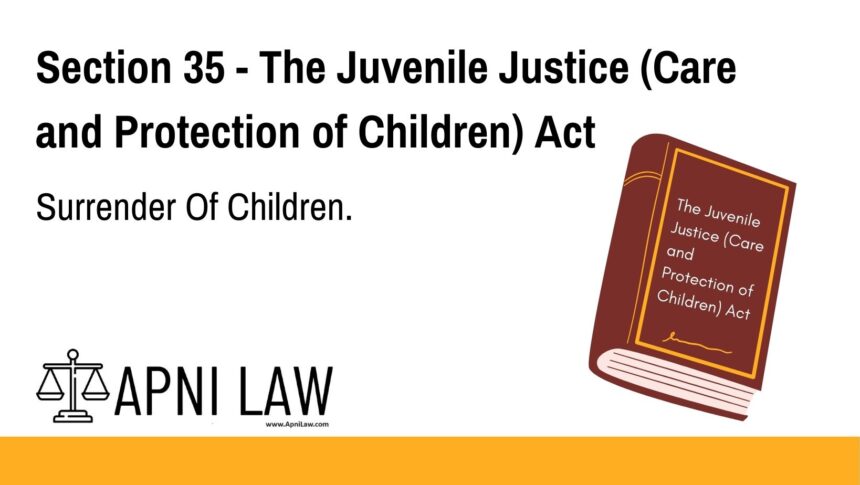Code
(1) A parent or guardian, who for physical, emotional and social factors beyond their control, wishes to surrender a child, shall produce the child before the Committee.
(2) If, after prescribed process of inquiry and counselling, the Committee is satisfied, a surrender deed shall be executed by the parent or guardian, as the case may be, before the Committee.
(3) The parents or guardian who surrendered the child, shall be given two months time to reconsider their decision and in the intervening period the Committee shall either allow, after due inquiry, the child to be with the parents or guardian under supervision, or place the child in a specialised Adoption Agency, if he or she is below six years of age, or a childrens home if he is above six years.
Explanation
Section 35 outlines a legal and compassionate process through which a parent or guardian may surrender a child to the Child Welfare Committee (CWC) when faced with circumstances beyond their control. This provision ensures that the act of surrender is voluntary, informed, and reviewed over time.
Before surrendering, the parent or guardian must appear before the Committee. A thorough process of inquiry and counselling is conducted. If the Committee is convinced of the genuineness of the reasons, a formal surrender deed is executed.
Importantly, parents/guardians are granted a reconsideration period of two months, during which the Committee can either temporarily return the child under supervision or place them in appropriate care institutions.
Key Highlights
-
Surrender must be due to uncontrollable physical, emotional, or social conditions.
-
Requires appearance before the Child Welfare Committee.
-
Includes mandatory counselling and inquiry.
-
A formal surrender deed must be signed.
-
2-month reconsideration period granted to parents/guardians.
-
Interim care placement varies based on child’s age:
-
Below 6 years: Specialised Adoption Agency
-
Above 6 years: Children’s Home
-
Illustration
👩👧 Example: A single mother, financially destitute and socially isolated, seeks to surrender her 3-year-old daughter. She approaches the Child Welfare Committee, explains her situation, and undergoes counselling. After evaluation, the Committee executes a surrender deed and places the child in a Specialised Adoption Agency while the mother is given two months to reconsider.
—
❓ Frequently Asked Questions (FAQs)
Q1: Is surrendering a child a punishable offence?
A: No, if done under Section 35 and for valid reasons beyond control, surrender is legal and regulated.
Q2: What happens if parents change their mind during the 2-month period?
A: They may request custody under supervision, and the Committee may approve it after review.
Q3: Who conducts the counselling and inquiry?
A: The Child Welfare Committee in coordination with trained social workers.
Q4: Can children above 6 years also be surrendered?
A: Yes, but they are placed in a Children’s Home instead of a Specialised Adoption Agency.
🔗 Related Links
-
Section 38 – Legal Declaration of Child Free for Adoption
Conclusion
Section 35 of the Juvenile Justice Act provides a sensitive and legally secure framework for parents or guardians who feel compelled to surrender their child due to factors beyond their control. It ensures that such a serious decision is made thoughtfully, with the oversight of the Child Welfare Committee, and provides a safeguard through the two-month reconsideration period. This process upholds the best interests of the child while respecting the difficulties faced by the family, ensuring dignity and legal protection throughout.








